- Home
- Pam Jenoff
A Hidden Affair
A Hidden Affair Read online
A Hidden Affair
ALSO BY PAM JENOFF
The Kommandant’s Girl
The Diplomat’s Wife
Almost Home
A Division of Simon & Schuster, Inc.
1230 Avenue of the Americas
New York, NY 10020
www.SimonandSchuster.com
This book is a work of fiction. Names, characters, places, and incidents either
are products of the author’s imagination or are used fictitiously. Any resemblance
to actual events or locales or persons, living or dead, is entirely coincidental.
Copyright © 2010 by Pam Jenoff
All rights reserved, including the right to reproduce this book or portions thereof
in any form whatsoever. For information address Atria Books Subsidiary
Rights Department, 1230 Avenue of the Americas, New York, NY 10020
First Atria Books hardcover edition July 2010
ATRIA BOOKS and colophon are trademarks of Simon & Schuster, Inc.
For information about special discounts for bulk purchases,
please contact Simon & Schuster Special Sales at
1-866-506-1949 or [email protected].
The Simon & Schuster Speakers Bureau can bring authors to your live event.
For more information or to book an event contact the
Simon & Schuster Speakers Bureau at 1-866-248-3049
or visit our website at www.simonspeakers.com.
Designed by Davina Mock-Maniscalco
Manufactured in the United States of America
10 9 8 7 6 5 4 3 2 1
Library of Congress Cataloging-in-Publication Data is available.
ISBN 978-1-4165-9071-2
ISBN 978-1-4165-9795-7 (ebook)
For Benjamin, the Love of my Life
In water one sees one’s own face;
But in wine one beholds the heart of another.
—FRENCH PROVERB
A Hidden Affair
chapter ONE
I GAZE ACROSS THE veranda, beyond the rows of yachts and sailboats bobbing in the Porte de Monaco toward the sparkling Mediterranean waters. To my right, the shoreline curves inward before jutting out to sea again at La Condamine, the cluster of tall gleaming buildings that rise against the steep, rocky hillside. A drop of perspiration runs down the glass carafe of water that sits before me and seeps into the white linen cloth. From the dozen or so other tables around mine comes the quiet murmur of conversation, mingled with spoons clinking against teacups and the gentle rustling of morning newspapers.
Inhaling the mix of salt air and coffee, tinged with a hint of citrus, I tilt my head upward. Above the canvas-and-bamboo umbrella, the sky is an unbroken blue. It is hard to believe that just two days ago I was in England. I took the last evening flight from Heathrow, rushing to the airport only to be predictably delayed by fog. We didn’t land in Milan until almost three in the morning, and I briefly considered getting a hotel room there, catching a few hours of sleep. But eager to reach my destination, I decided against it. Instead, I took a taxi to the train station, loitering over cups of burned cappuccino in the all-night café until the ticket office opened at four thirty. Half an hour later I boarded the train to Monaco.
We traveled through the gritty outskirts of the city in the darkness, stopping twice at remote stations for passengers before picking up speed and moving through the rugged border region between Italy and France. As we reached the coast, the sun seemed to rise suddenly behind us, a floodlight on a movie set, revealing the jagged peaks above, blue waters below. The terraced hills were broken indiscriminately by grand mansions and simple cottages that seemed to share the breathtaking environs with egalitarian ease.
The train slowed again to a leisurely pace, hugging the mountainside, unfazed by the sports cars and lorries that raced along the thin strip of road beside it. As the sun climbed higher in the sky, a man opened one of the carriage doors facing the sea and hung carelessly by his arms from the top, open shirt blowing in the breeze.
It was not the first time I had taken this journey. I had been here as a student during the summer holiday between my first and second years at Cambridge, on a monthlong backpacking trip across Europe with a few of my British classmates. We spent three nights sleeping on the floor of an apartment owned by a friend of a friend whose mother had remarried a Monaco native. After weeks of tents and public campground bathrooms, the tiny flat, with its washing machine and real shower, felt like paradise. I remember being struck by the dramatic terrain of the Côte d’Azur, the idyllic tropical beauty that seemed so improbable in my American view of what Europe would be like. I left reluctantly, hoping to return again someday. But I certainly never expected to be here now. Not like this.
I take a sip of coffee, tearing my gaze reluctantly from the sea, and reach into the leather tote that sits by my feet. Feeling instinctively around the familiar contents, I pull out a manila file. My boss, Maureen, gave it to me at the embassy in London, just minutes after she dropped the bombshell that would change my life forever: Jared, my college boyfriend, did not drown in the river a decade ago as I believed, but had faked his death and disappeared from Cambridge.
I thumb through the file, which I took with me when leaving the embassy after I resigned my State Department commission. It contains all of the information Mo had about Jared’s whereabouts these past ten years, or so she claimed. Pictures, reports, and other notes form a tapestry of Jared’s life after he vanished. There are little snippets about the places he had been, how he’d lived, what he had done after he’d left. A few aliases he’d used in the early years. Mo gave me the file in exchange for my silence. I wonder now if it was worth the price. Most of the details are months or years out-of-date. Only one scrap of paper, bearing the address of a Monaco apartment building, is of any possible use. That’s what brought me here.
I close the file and take another sip of coffee, staring out once more across the water. The warm paradise is such a sharp contrast to gray, chilly England. It was just a few weeks ago that I requested the assignment to the London embassy in order to be by the side of my closest friend, Sarah, as she struggled against Lou Gehrig’s disease. Then, it seemed that returning to England for the first time since Jared died, confronting my memories, would be the hardest thing I would ever have to do. But Sarah had summoned me, or so I thought, and so, steeling myself, I asked the Director to reassign me to the embassy in London.
It should have been straightforward: take care of Sarah, do my job, try not to get too buried in my memories. But then, shortly after my arrival, our classmate Chris approached me, stirring up the questions about Jared’s death that I had always been too afraid to ask. What had really happened that night? The answer, we quickly learned once I agreed to help Chris do some digging, was not the one we had been given years earlier. Jared’s death was not an accident. But that only begged more questions, darker ones: Who had wanted him dead, and why?
Jared. My breath catches as his face appears in my mind. I see him, as I always do, standing on the deck of the boathouse the day we met, tall and handsome, silhouetted against the pale, predawn sky. Ours was hardly love at first sight. We clashed horribly, him unable to control his frustration at my relative lack of experience as a coxswain, me at first terrified and later angered by his terse ways. With such intense dislike, I hadn’t seen it coming, the heated kiss on the balcony overlooking the Thames months later. After, there was never any question that we would be together.
Together, at least, for a short while. We knew from the start that we had three months until my scholarship ended and I would be forced to return to America. And then, weeks before my scheduled departure, he was gone, purportedly drowned in the river. It was a s
tory without an ending—until now. I still cannot believe that he is alive, that in hours or days I might see him again.
Might be alive, a voice in my head, not my own, reminds gently. He was last seen some time ago, perhaps, at a flat just minutes away from where I now sit. All I have is an address, no confirmation that he has been there recently or information as to the reliability of the source. But it was all I had to go on, and so I got on the plane. Finding Jared is the one thing that still makes sense, the only thing that matters.
But the revelation that he might be alive raised more questions than it had answered and even as I envision the reunion that for the past ten years had seemed impossible, nagging thoughts intrude: Why did Jared disappear without telling me? Why didn’t he come back, or at least contact me to let me know he was not dead, instead of allowing me to grieve all of these years?
I tuck the file back into my bag. There will be time for questions later; first I have to find Jared. I signal the waiter over to sign for the bill, then walk across the terrace and into the lobby. The hotel, with its fifty-odd rooms, is exactly the kind I like, intimate, yet large enough for me to be inconspicuous.
“Mademoiselle Weiss?” As I pass the front desk, a voice jars me from my thoughts.
Surprised, I turn to face the clerk who helped me check in the previous day. So much for inconspicuous. “Yes?”
He is holding out an envelope in my direction. “For you.”
I stare at his outstretched hand for several seconds, my heart pounding. No one is supposed to know I am here. Reluctantly, I take the envelope with my name typed on the front from him, tear it open. A card falls to the ground and as I scramble to pick it up, Maureen’s familiar handwriting, long and flowery, seems to leap out toward me.
I’m sorry, the note reads. Good luck, be careful, and thank you for understanding.
I relax slightly. Maureen is not coming after me. At least not yet. Her note is another apology for her betrayal. But how did she track me down?
I feel inside the envelope once more. There is a thin stack of traveler’s checks, held together by a paper clip. I thumb through them. There must be at least five thousand dollars. My anger flares. Does Mo think that she can buy my silence? But she did not intend it that way, I realize quickly. The money is a reaffirmation of our agreement: I will not report to the State Department the secret that would surely end her career when she is just a step away from becoming an ambassador. In exchange, she will not tell anyone else where I am, or stop me from doing what I have set out to do.
Of course, her note is wrong in one respect: I do not understand. Mo had been my mentor and friend. Yet she lied to me, and made me a pawn in her political game. My fury rises to full boil. I cannot imagine understanding or forgiving what she did, not now. Not ever.
My shoulders slump with fatigue. I suppose I should be grateful; in the end, she gave me the one piece of information that matters. Without Mo and her elaborate subterfuge, I might never have discovered that Jared is alive.
I approach the clerk at the desk once more. “Checking out,” I say, thinking ruefully of my room with its crisp sheets, the small patio overlooking the harbor. But I cannot stay put any longer, not with Mo knowing where I am. No, I will move to one of the smaller pensions, somewhere nondescript that will take a cash deposit in lieu of a credit card without looking too closely.
I reach for my wallet, then pause, considering the traveler’s checks. In principle I hate to touch them, to imply that my silence can be bought. But I don’t know how long I will be on the road, how far my savings will go having quit my job. I hand the clerk three of the checks, accepting the change he hands me in euros.
“Would you like help with your luggage?” he asks.
“No, thank you.” I have nothing other than the tote I carry. I’ve always been a light traveler, and the two suitcases I brought to London were destroyed in a gas explosion at my flat. In my mind I see the charred rubble, the rescue workers carrying a body bag from the site. Tears fill my eyes. I was supposed to have died in that explosion. Instead, my colleague Sophie lost her life when she stopped by to pick something up at my request. Guilt mixes with my anger. I will honor my agreement with Mo and not turn her in, at least for now. But she and the others will pay someday for the lives that were lost for their gain.
Swallowing my rage, I walk out of the hotel and start up the sloping, palm tree–flanked street, my sandals scuffing lightly against the pavement. The shops that line the sidewalk are a parade of expensive boutiques touting couture clothing, Swiss watches, fur coats that seem ludicrous in this tropical climate. Tanned tourists dart in and out of the stores with large shopping bags, ants carrying food back to the nest. The conversations around me are in a mixture of French and German and other languages I cannot quite discern.
I pause, catching a glimpse of my reflection in the window of a gourmet chocolate shop. Though my complexion is a bit pale, the white linen blouse and khaki capris I bought after arriving blend in easily. I put on one of my other purchases, a pair of oversized tortoise sunglasses, and continue walking. My gait slows, stride growing more relaxed. There is something comforting about being anonymous in this strange city, lost in the crowd. Of course, at some point I will have to check on Sarah, let my parents know I’m no longer in England. But for now, I am completely alone.
A few minutes later the street grows narrower and the throngs of shoppers thin, a rare quiet enclave in this crowded, tourist-soaked principality. The stores here are less grand, an easy mix of art galleries, booksellers, groceries, and wine shops. I turn a corner, then stop in front of a familiar café, weaving through the close-set outdoor tables, choosing one midway back to the left. A barista appears and takes my order.
When she has gone, I pull a notebook from my bag and lean back. I spent most of yesterday afternoon here, sipping cappuccinos. I placed the notebook in front of me, pretending to scribble in it like a traveler with a journal. In reality I kept my gaze fixed on the terraced building across the street to the right—number 12 rue des Lilas. It is the address in the file that Maureen gave me, the one where Jared was last seen months earlier.
The file did not contain an apartment number, though. Not knowing which unit in the four-story building might be Jared’s, I fought the urge to pound on every door, instead taking a seat at the café to watch and wait. But there was no sign of Jared. The residents who came and went from the building were mostly old, leathery, hunch-shouldered seniors shuffling to the taxi stand at the corner or pushing wheeled shopping carts down the block. I found myself studying them, wondering what they had done to earn the millions of dollars needed to be residents here and afford this opulent lifestyle.
I didn’t see anyone resembling Jared, and as the afternoon wore on, I grew frustrated. Did I really expect to find him here at a flat he might have happened to visit or occupy briefly some time ago? But the address was the only thing I had to go on, and I did not know where I would go next if the lead proved futile. So I came again today, ready to wait and watch the building like a dog hovering over a rabbit hole.
What was Jared doing in Monaco anyway, I wonder now, as the barista returns with my drink. He always hated places like this, crowded and pretentious. Even college life in bucolic Cambridge had been too claustrophobic for him. Jared was drawn to quiet, remote locations—the roof of the chapel where we perched so improbably the night of the boat club dinner, talking and putting some of our initial dislike for each other behind us as we watched the party unfold below, or the spot by the riverbank where he would go to think so often in those final haunted days before he was gone. When Jared was forced to be part of a group, he was usually listening, taking things in quietly from the outside. That’s why he loved being on the water, I realize now, picturing him in the seven seat of the boat behind Chris, face locked in grim determination. There was an escape, a meditative quality to the rhythm of each stroke that communicated without speech. No, I conclude, taking in the street once more, it is
impossible to picture Jared here.
Stirring the drink, I observe the other café patrons: a group of women clustered by the periphery, babies on their laps, miniature dogs half-sleeping at their feet; an elderly couple sharing a croissant, not speaking. At the far edge of the patio a man sits by himself, holding an open newspaper in front of him. He does not belong, I decide instantly, taking in his profile. Though his skin is appropriately bronzed, his features are strong, the square jaw and pronounced brow more Slavic than Mediterranean. His white T-shirt clings just a shade too closely to his raw, masculine frame to be fashionable. Of course, Monaco is a city of foreigners. But this thirtysomething man, with his broad shoulders and close-cropped brown hair, looks more military than tourist.
The man turns slightly and his gaze catches mine. I drop my eyes hurriedly to my notebook. Did he notice me watching him? Unlikely, I remind myself, remembering my sunglasses. But I can feel my cheeks redden as a surge of warmth runs through me. The stranger is more attractive than I anticipated from studying his profile. I push the thought away. In the years since I was with Jared, I almost let my guard down once, becoming close to Sebastian, the Scottish agent assigned to our investigation team in London. But I allowed my feelings to cloud my judgment—a mistake that nearly cost me my life.
No, there is only one man I am interested in, and he is Jared. I’ve pictured it a thousand times in the past few days, finding him again, seeing him alive. The vision, banished from my mind for all of the years I thought he was dead, comes unbidden now with every breath. I imagine his face breaking into one of its hard-won smiles that crinkled the edges of his emerald green eyes, strong arms encircling me. But what would our reunion really be like? Would it be awkward or would our feelings, easy and unspoken, resume as though uninterrupted by the years?
I glance up once more, avoiding the direction of the stranger, watching the apartment building as I sip my tea. A blond woman in a flowing print skirt strides down the street and opens the gate to the building. I saw the same woman leaving the previous day, her hair pulled back in a sleek chignon. She stuck in my mind because she was so much younger than the other residents that I wondered if she was visiting a grandparent. But she carries a bag of groceries, unlocking the door to the building with an ease suggesting she lives there. Her hair is loose today, falling straight just below her shoulders.

 The Orphan's Tale
The Orphan's Tale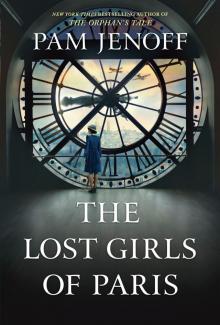 The Lost Girls of Paris
The Lost Girls of Paris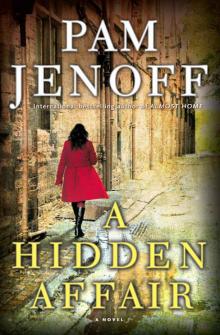 A Hidden Affair: A Novel
A Hidden Affair: A Novel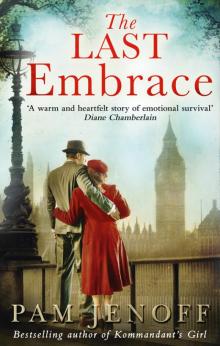 The Last Embrace
The Last Embrace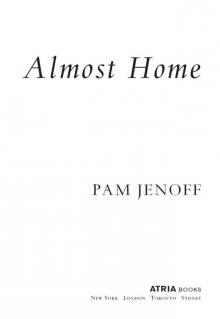 Almost Home: A Novel
Almost Home: A Novel A Hidden Affair
A Hidden Affair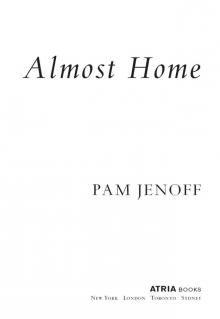 Almost Home
Almost Home The Winter Guest
The Winter Guest The Last Summer at Chelsea Beach
The Last Summer at Chelsea Beach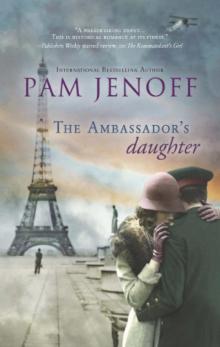 The Ambassador's Daughter
The Ambassador's Daughter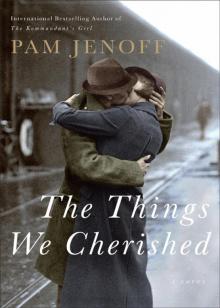 The Things We Cherished
The Things We Cherished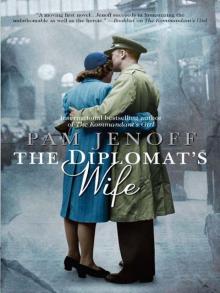 The Diplomat's Wife
The Diplomat's Wife The Kommandant's Girl
The Kommandant's Girl The Other Girl
The Other Girl